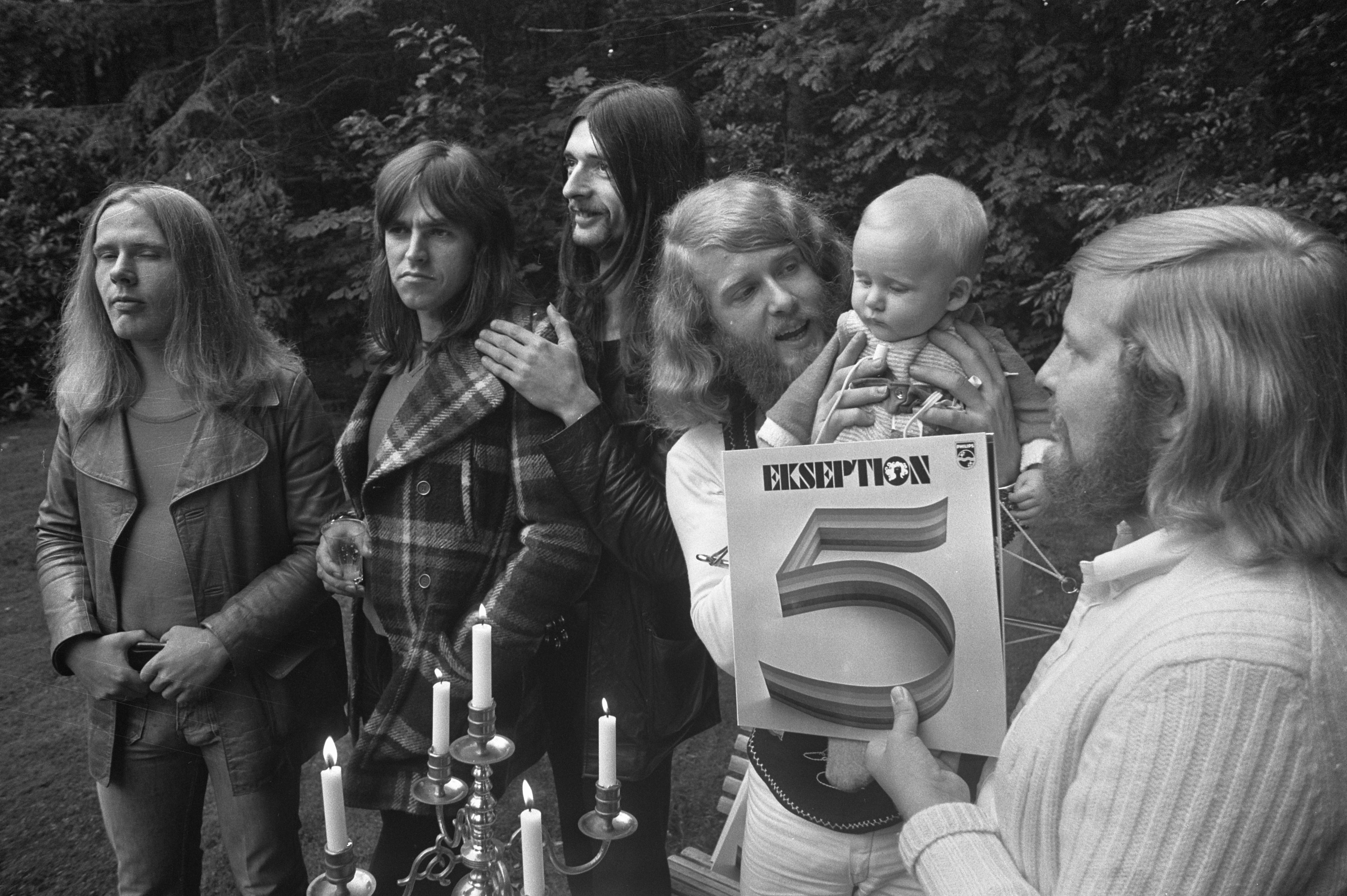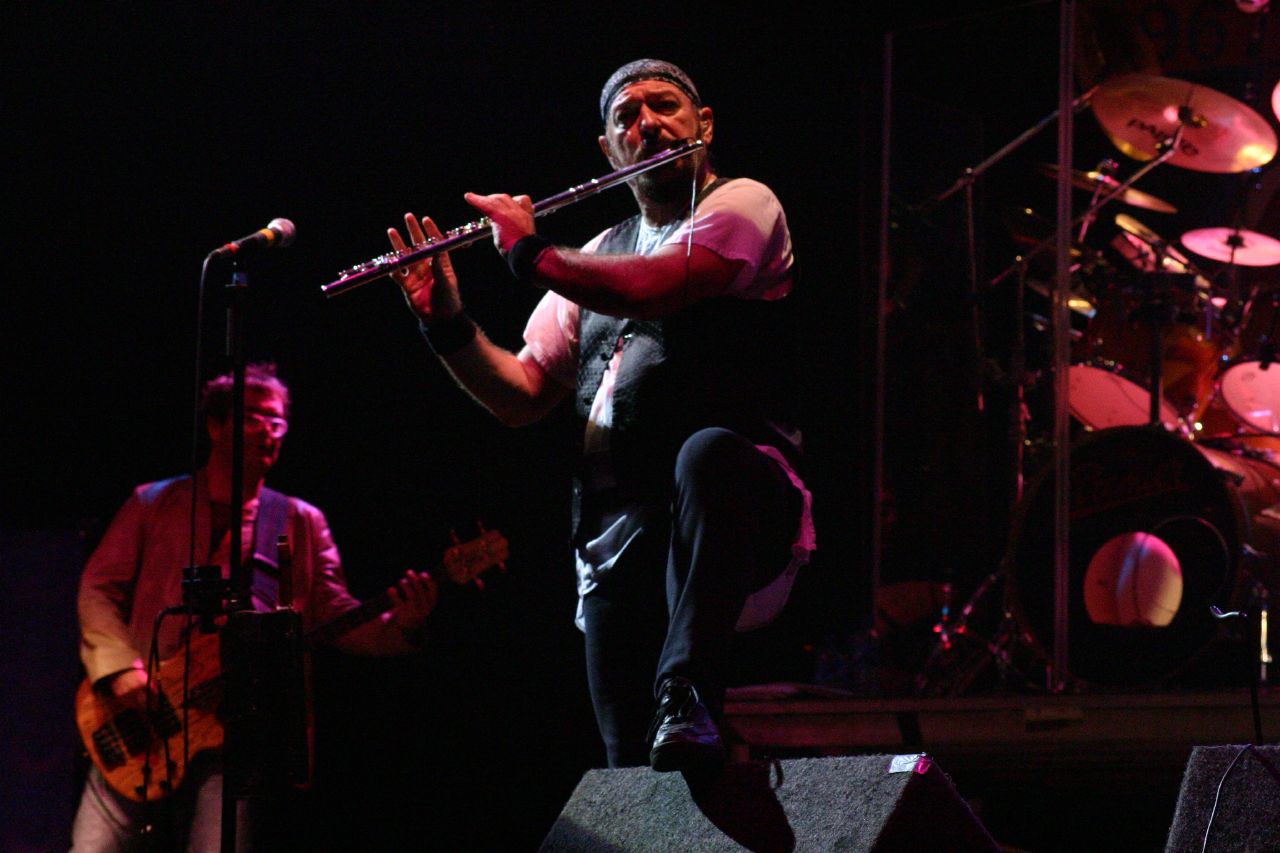|
Ekseption
Ekseption was a Dutch rock band active from 1967 to 1989, playing mostly-instrumental progressive rock and classical rock. The central character in the changing roster, and the only band member present on every album, was conservatory-trained trumpeter Rein van den Broek (10 September 1945 - 11 May 2015). The band saw some commercial success in the 1970s, having Dutch top ten hit singles with their adaptations of Beethoven's "Fifth" and Bach's "Air". The second album, ''Beggar Julia's Time Trip'' (1969), won the Dutch Edison Award for album of the year, and the first five albums all went gold. History Ekseption grew out of the high-school band The Jokers, which van den Broek formed in 1958. They changed their name to The Incrowd (after the Ramsey Lewis song) before discovering that name was already taken. Finally they settled on the name Ekseption in 1967. The group played jazz, pop and R&B covers, but in 1969, shortly after keyboardist Rick van der Linden joined, they were ... [...More Info...] [...Related Items...] OR: [Wikipedia] [Google] [Baidu] |
Rick Van Der Linden
Rick van der Linden (5 August 1946, Badhoevedorp, North Holland - 22 January 2006, Groningen) was a Dutch composer and keyboardist. Van der Linden first gained fame as a member of Ekseption, but he played in several other bands including most notably Trace, as well as solo. Van der Linden was best known for his reworkings of classical music in a pop music domain, often with jazz improvisations. History Rick van der Linden was born in the village of Badhoevedorp, not far from Amsterdam, the second of five van der Linden children. His family moved when Rick was only 5 weeks old to Rotterdam, where they lived until 1957. He started piano lessons at age 7, but gave them up two years later because he wasn't enjoying them. When he was 11, his family moved again, to Haarlem where van der Linden attended the Triniteitslyceum. At 13, his father convinced Rick to try the piano again, so he was enrolled at the Haarlem School of Music. Two years later he became a private pupil of the Piet Vi ... [...More Info...] [...Related Items...] OR: [Wikipedia] [Google] [Baidu] |
Trace (band)
Trace was a Dutch progressive rock trio founded by Rick van der Linden in 1974 after leaving Ekseption. The band was formed in 1971 and released its debut album, "Trace," in 1974. The band's music was characterized by complex arrangements and intricate instrumental work, and their compositions often featured a mix of rock, jazz, and classical influences. Trace released a total of three albums during their career. Trace was fairly popular in Europe, and they gained a loyal following among fans of progressive rock. However, they never achieved widespread commercial success and disbanded in the late 1970s, merging back into Ekseption. Despite this, the band's music has continued to be appreciated by fans of progressive rock. History In 1973, after releasing their album entitled ''Trinity,'' the other members of Ekseption asked Rick van der Linden to leave the band. At this time Ekseption were quite famous which led Philips, their record-company, to give van der Linden the oppor ... [...More Info...] [...Related Items...] OR: [Wikipedia] [Google] [Baidu] |
Sabre Dance
"Sabre Dance", ''Suserov par''; russian: Танец с саблями, ''Tanets s sablyami'' is a movement in the final act of Aram Khachaturian's ballet '' Gayane'' (1942), where the dancers display their skill with sabres. It is Khachaturian's best known and most recognizable work worldwide. It is notable for its employment of percussion instruments, especially the xylophone. Its middle section is based on an unnamed Armenian folk song. According to Tigran Mansurian, it is a synthesis of an Armenian wedding dance tune from Gyumri tied in a saxophone counterpoint "that seems to come straight from America." "Sabre Dance" is considered one of the signature pieces of 20th-century popular music. It was popularized by covers by pop artists, first in the US in 1948 and later elsewhere. Its use in a wide range in films and television over the decades have significantly contributed to its renown. "Sabre Dance" has also been used by a number of figure skaters from at least five coun ... [...More Info...] [...Related Items...] OR: [Wikipedia] [Google] [Baidu] |
Philips Records
Philips Records is a record label founded by the Dutch electronics company Philips. It was founded as Philips Phonographische Industrie in 1950. In 1946, Philips acquired the company which pressed records for British Decca's Dutch outlet in Amsterdam. History The record label originated as "Philips Phonographische Industrie" (PPI) in June 1950 when it began issuing classical music recordings. Recordings were also made of popular artists of multiple nationalities and of classical artists from Germany, France and the Netherlands. Launched under the slogan "Records of the Century" (referring to Philips Industries' UK Head Office at Century House, W1), the first releases in Britain appeared in January 1953 on 10" 78 rpm discs, with LPs appearing in July 1954. Philips also distributed recordings made by the United States Columbia Records (which at the time was a unit of CBS) in the UK and on the European continent. After the separation of the English Columbia label (owned by E ... [...More Info...] [...Related Items...] OR: [Wikipedia] [Google] [Baidu] |
Haarlem
Haarlem (; predecessor of ''Harlem'' in English) is a city and municipality in the Netherlands. It is the capital of the province of North Holland. Haarlem is situated at the northern edge of the Randstad, one of the most populated metropolitan areas in Europe; it is also part of the Amsterdam metropolitan area, being located about 15 km to the west of the core city of Amsterdam. Haarlem had a population of in . Haarlem was granted city status or '' stadsrechten'' in 1245, although the first city walls were not built until 1270. The modern city encompasses the former municipality of Schoten as well as parts that previously belonged to Bloemendaal and Heemstede. Apart from the city, the municipality of Haarlem also includes the western part of the village of Spaarndam. Newer sections of Spaarndam lie within the neighbouring municipality of Haarlemmermeer. Geography Haarlem is located on the river Spaarne, giving it its nickname 'Spaarnestad' (Spaarne city). It is ... [...More Info...] [...Related Items...] OR: [Wikipedia] [Google] [Baidu] |
The 'In' Crowd (song)
"The 'In' Crowd" is a 1964 song written by Billy Page and arranged by his brother Gene and originally performed by Dobie Gray on his album ''Dobie Gray Sings for "In" Crowders That Go "Go-Go"''. It appeared on an episode of '' Dick Clark's Rock, Roll & Remember'', featuring in the last week of November 1964, the month Gray's rendition was released. Chart performance In the US, Gray's powerful Motown-like version, complete with brass section, reached number 11 on the Hot Rhythm & Blues Singles chart and number 13 on the ''Billboard'' Hot 100 on 20 February 1965. Outside the US, "The 'In' Crowd" went to number 25 on the UK Singles Chart, and number 8 in Canada. Gray's Shindig! performance of the song aired on 10 March 1965. Ramsey Lewis's instrumental version The Ramsey Lewis Trio recorded an instrumental version of the tune later in 1965. Their jazzy take, recorded live at Bohemian Caverns, a Washington, D.C., night club, reached number 5 on the Hot 100 on 9 October 1965, ... [...More Info...] [...Related Items...] OR: [Wikipedia] [Google] [Baidu] |
Jethro Tull (band)
Jethro Tull are a British rock band formed in Blackpool, England, in 1967. Initially playing blues rock and jazz fusion, the band soon incorporated elements of English folk, hard rock, and classical music, forging a signature progressive rock sound. The group’s bandleader, founder, primary composer, and only constant member is Ian Anderson, a multi-instrumentalist who mainly plays flute and acoustic guitar, and is also the lead vocalist. The group has featured a revolving door of musicians throughout the decades, including significant contributors such as electric guitarist Martin Barre (the longest serving member besides Anderson), keyboardists John Evan, Dee Palmer, Peter-John Vettese, and Andrew Giddings, drummers Clive Bunker, Barrie "Barriemore" Barlow, and Doane Perry, and bassists Glenn Cornick, Jeffrey Hammond, John Glascock, Dave Pegg, and Jonathan Noyce. After achieving moderate recognition performing in the London club scene, the band released the ... [...More Info...] [...Related Items...] OR: [Wikipedia] [Google] [Baidu] |
Alquin
Alquin was a Dutch progressive rock Progressive rock (shortened as prog rock or simply prog; sometimes conflated with art rock) is a broad genre of rock music that developed in the United Kingdom and United States through the mid- to late 1960s, peaking in the early 1970s. Init ... band which released four studio albums in the 1970s.http://www.rentrock.nl/alquin/alquinbiouk.htm Official biography The band split in 1977. They made a comeback in 2003 and in September 2005 they released a new album. Discography Studio albums * 1972 - Marks - 12"LP - POLYDOR - 2925 012 * 1973 - Mountain Queen - 12"LP - POLYDOR - 2925 019 * 1975 - Nobody Can Wait Forever (NL Version) - 12"LP - POLYDOR - 2925 030 * 1975 - Nobody Can Wait Forever (UK Version) - 12"LP - POLYDOR - 2480 262 * 1975 - Nobody Can Wait Forever (US Version) - 12"LP - RCA VICTOR - APL1 1061 * 1976 - Best Kept Secret - 12"LP - POLYDOR - 2925 045 * 2005 - Blue Planet - CD - HUNTER MUSIC - 771 617 2 * 2009 - Sai ... [...More Info...] [...Related Items...] OR: [Wikipedia] [Google] [Baidu] |
Classical Rock
Progressive rock (shortened as prog rock or simply prog; sometimes conflated with art rock) is a broad genre of rock music that developed in the United Kingdom and United States through the mid- to late 1960s, peaking in the early 1970s. Initially termed "progressive pop", the style was an outgrowth of psychedelic bands who abandoned standard pop traditions in favour of instrumentation and compositional techniques more frequently associated with jazz, folk, or classical music. Additional elements contributed to its "progressive" label: lyrics were more poetic, technology was harnessed for new sounds, music approached the condition of "art", and the studio, rather than the stage, became the focus of musical activity, which often involved creating music for listening rather than dancing. Progressive rock is based on fusions of styles, approaches and genres, involving a continuous move between formalism and eclecticism. Due to its historical reception, the scope of progressive ... [...More Info...] [...Related Items...] OR: [Wikipedia] [Google] [Baidu] |
The Nice
The Nice were an English progressive rock band active in the late 1960s. They blended rock, jazz and classical music and were keyboardist Keith Emerson's first commercially successful band. The group was formed in 1967 by Emerson, Lee Jackson, David O'List and Ian Hague to back soul singer P. P. Arnold. After replacing Hague with Brian Davison, the group set out on their own, quickly developing a strong live following. The group's stage performances featured Emerson's Hammond organ showmanship and abuse of the instrument. Their compositions included radical rearrangements of classical music themes and Bob Dylan songs. The band achieved commercial success with an instrumental rearrangement of Leonard Bernstein's "America", following which O'List left the group. The remaining members carried on as a trio, releasing several albums, before Emerson decided to leave the band in early 1970 in order to form Emerson, Lake & Palmer. The group briefly reformed in 2002 for a series o ... [...More Info...] [...Related Items...] OR: [Wikipedia] [Google] [Baidu] |
Cover Version
In popular music, a cover version, cover song, remake, revival, or simply cover, is a new performance or recording by a musician other than the original performer or composer of the song. Originally, it referred to a version of a song released around the same time as the original in order to compete with it. Now, it refers to any subsequent version performed after the original. History The term "cover" goes back decades when cover version originally described a rival version of a tune recorded to compete with the recently released (original) version. Examples of records covered include Paul Williams' 1949 hit tune "The Hucklebuck" and Hank Williams' 1952 song " Jambalaya". Both crossed over to the popular hit parade and had numerous hit versions. Before the mid-20th century, the notion of an original version of a popular tune would have seemed slightly odd – the production of musical entertainment was seen as a live event, even if it was reproduced at home via a c ... [...More Info...] [...Related Items...] OR: [Wikipedia] [Google] [Baidu] |





